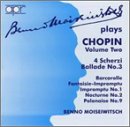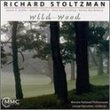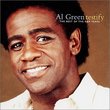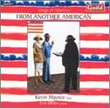| All Artists: Chopin, Moiseiwitsch Title: Benno Moiseiwitsch Plays 2 Members Wishing: 1 Total Copies: 0 Label: Apr UK Release Date: 3/25/2003 Genre: Classical Styles: Chamber Music, Forms & Genres, Ballads, Fantasies, Historical Periods, Classical (c.1770-1830) Number of Discs: 1 SwapaCD Credits: 1 UPCs: 524709155767, 5024709155767 |
Search - Chopin, Moiseiwitsch :: Benno Moiseiwitsch Plays 2
 | Chopin, Moiseiwitsch Benno Moiseiwitsch Plays 2 Genre: Classical
|
Larger Image |
CD DetailsSimilar CDs |
CD ReviewsGorgeous Barcarolle and 3d Ballade Anton Zimmerling | Moscow, Russia | 07/12/2008 (5 out of 5 stars) "I agree with Mr. Levitt that this Moiseiwitch CD on Appian Recording (APR)is a desirable addition to every Chopin collection, and that Moiseiwitsch's phrasing and touch are very beuatiful. It is true that Moiseiwitch's individual singing tone is more easily recognizable on record when plays piano and pianissimo than when he plays forte or fortissimo. He was a supreme colourist and had a fine sense of dramatic rubato.
Moiseiwitch's Chopin has a pronounced Eastern-European flavour and deviates from the Western tradition, exemplified by such different artists as Cortot and Rubinstein, to give just few names. Many collectors will like Moiseiwitsch's Chopin exactly because of that, while some purists may discard it on the same reason. I think the best way is to believe one's ears, but not to learn in advance that "M. is a great pianist and everything recorded by him is great, too" or "M. did not belong to the right tradition and his interpretations cannot match the best variants" etc. etc. As for the interpretations, each listener will find its own favourites on this excellent CD. To my mind, the greatest achievements of Moiseiwitch on this CD are 3d Ballade in A flat (1927)-- do not mind an early recording date, the sound is good! -- and Barcarolle Op. 60 recorded in 1941, when the pianist was at his peak (to judge upon his recorded heritage). Some critics can object that Chopin's Barcarolle is not the composer's main masterpiece, but Moiseiwitch plays it as great music -- and plays it greatly. The same holds for Fantasie-Impromptu Op. 66 recorded as late as in 1952. I would also make special mention of Polonaise No. 9 in B flat Op. 71/2. Despite of its number, it is an early piece and its structure is more simple than that of classic Polonaises. But Moiseiwitch plays it with a real fervour, and the 4 minutes it lasts are unforgettable. What about the 4 Scherzos -- the only one complete Chopin's selection on this CD? They are fine. The first Scherzo is direct and convincing, and the fourth is elegant, too. In second and third Scherzos Moiseiwitsch's approach is less satisfying, since these pieces beg for a more expressive interpretation. But I am possibly spoiled by more strict or more dramatic accounts of this music." |

 Track Listings (15) - Disc #1
Track Listings (15) - Disc #1


